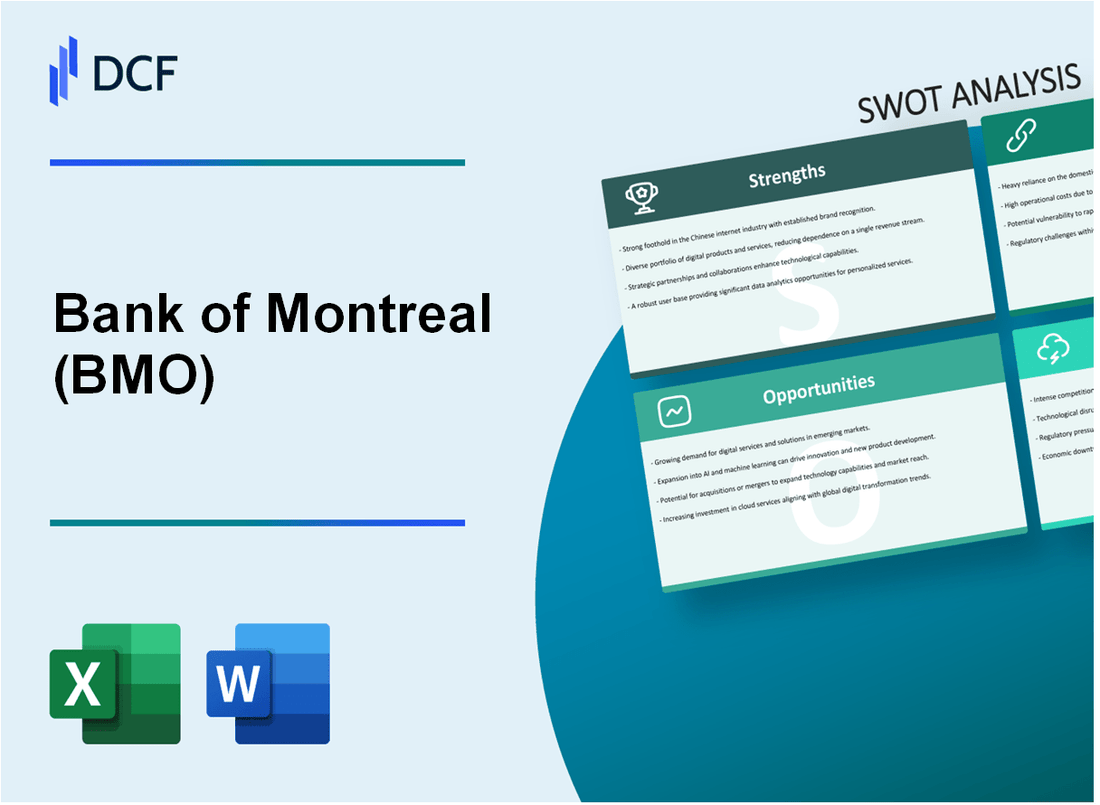
|
Bank of Montreal (BMO): SWOT Analysis [Jan-2025 Updated] |

Fully Editable: Tailor To Your Needs In Excel Or Sheets
Professional Design: Trusted, Industry-Standard Templates
Investor-Approved Valuation Models
MAC/PC Compatible, Fully Unlocked
No Expertise Is Needed; Easy To Follow
Bank of Montreal (BMO) Bundle
In the dynamic landscape of Canadian banking, Bank of Montreal (BMO) stands as a strategic powerhouse navigating complex financial terrains with remarkable resilience and innovation. As we dive into a comprehensive SWOT analysis for 2024, this exploration reveals how BMO's robust financial ecosystem, digital transformation initiatives, and strategic positioning are poised to leverage strengths while proactively addressing potential challenges in an increasingly competitive banking marketplace. Discover the intricate layers of BMO's competitive strategy that continue to solidify its reputation as a leading financial institution in North America.
Bank of Montreal (BMO) - SWOT Analysis: Strengths
Strong Presence in Canadian Banking with Extensive Branch Network
As of 2024, Bank of Montreal operates 900+ branches across Canada, with significant market presence in key provinces:
| Province | Number of Branches |
|---|---|
| Ontario | 450 |
| Quebec | 250 |
| Western Canada | 200 |
Diversified Financial Services
BMO offers comprehensive financial services across multiple segments:
- Personal Banking
- Commercial Banking
- Investment Banking
- Wealth Management
Robust Digital Banking Platform
Digital banking metrics as of 2024:
- 3.8 million active digital banking users
- 72% of customer interactions through digital channels
- Mobile banking app with 4.6/5 user rating
Solid Financial Performance
| Financial Metric | 2024 Value |
|---|---|
| Total Assets | $962 billion |
| Net Income | $8.3 billion |
| Return on Equity | 14.2% |
| Dividend Yield | 5.1% |
Brand Reputation
BMO's brand strength in North American financial markets:
- Ranked #3 among Canadian banks
- Established in 1817, making it one of North America's oldest banks
- Credit rating: A+ (Standard & Poor's)
Bank of Montreal (BMO) - SWOT Analysis: Weaknesses
Relatively Smaller International Presence
As of 2024, BMO's international operations represent approximately 15% of its total revenue, compared to larger global banks with 30-40% international market share. The bank operates primarily in Canada, United States, and limited parts of Europe.
| Geographic Revenue Distribution | Percentage |
|---|---|
| Canada | 68% |
| United States | 27% |
| International Markets | 5% |
High Dependency on Canadian Market Economic Conditions
BMO's financial performance is significantly tied to Canadian economic fluctuations. In 2023, approximately 68% of the bank's total revenue was generated from Canadian market operations.
Potential Regulatory Compliance and Technology Upgrade Costs
Technology and compliance investments for BMO are substantial:
- Annual technology spending: $1.2 billion
- Compliance and risk management costs: Estimated $450 million in 2024
- Cybersecurity infrastructure investments: $320 million
Limited Market Share in Emerging Financial Technology Sectors
BMO's digital banking market share in innovative fintech segments remains comparatively low:
| Fintech Segment | Market Penetration |
|---|---|
| Digital Payments | 7% |
| Blockchain Services | 3% |
| AI Financial Solutions | 5% |
Exposure to Potential Credit Risks
Credit risk exposure across key lending segments:
- Residential Mortgage Portfolio: $180 billion
- Commercial Lending Risk: $95 billion
- Potential Credit Loss Provisions: $1.4 billion in 2024
Bank of Montreal (BMO) - SWOT Analysis: Opportunities
Expanding Digital Banking and Fintech Innovation Capabilities
BMO has invested $1.3 billion in digital transformation initiatives for 2023-2024. The bank's digital banking platform reported 7.2 million active digital users as of Q4 2023, representing a 12% year-over-year growth.
| Digital Investment Area | Budget Allocation |
|---|---|
| AI and Machine Learning | $420 million |
| Cybersecurity Enhancements | $310 million |
| Mobile Banking Platform | $250 million |
Growing Potential in Sustainable and ESG-Focused Financial Products
BMO committed $500 billion towards sustainable financing and mobilization by 2030. Current ESG-related assets under management reached $42.3 billion in 2023.
- Green bond issuance increased by 35% compared to previous year
- Sustainable investment products grew by 22% in customer adoption
- Carbon-neutral banking initiatives expanded to 17 new product lines
Potential Market Expansion in US Banking Markets
BMO completed the acquisition of Bank of the West for $16.3 billion in January 2023, expanding its US market presence to 32 states with projected annual revenue of $2.4 billion from this acquisition.
| US Market Metrics | Current Performance |
|---|---|
| Total US Branch Network | 1,100+ branches |
| US Commercial Banking Portfolio | $87.6 billion |
| US Market Growth Projection | 14-16% annually |
Increasing Demand for Personalized Financial Advisory Services
BMO's wealth management segment reported $618 billion in assets under management, with digital advisory platforms experiencing 28% user growth in 2023.
- AI-driven personalized investment recommendations launched
- Digital financial planning tools integrated for 92% of wealth management clients
- Robo-advisory services expanded to cover 45% of investment portfolios
Strategic Acquisitions and Partnerships in Emerging Financial Technologies
BMO invested $275 million in fintech partnerships and technology acquisitions during 2023, targeting blockchain, AI, and advanced analytics platforms.
| Technology Partnership Focus | Investment Amount |
|---|---|
| Blockchain Technologies | $85 million |
| AI and Machine Learning | $120 million |
| Cybersecurity Innovations | $70 million |
Bank of Montreal (BMO) - SWOT Analysis: Threats
Increasing Competition from Digital-Native Banking Platforms
In 2023, digital banking platforms captured 34.6% of Canadian banking market share. Fintech companies like Wealthsimple and Koho have grown their customer base by 22% year-over-year, directly challenging traditional bank models.
| Digital Platform | Market Penetration | Annual Growth Rate |
|---|---|---|
| Wealthsimple | 1.2 million users | 22.3% |
| Koho | 500,000 users | 18.7% |
Potential Economic Downturn and Interest Rate Fluctuations
Bank of Canada's projected economic indicators suggest potential recession risks in 2024, with GDP growth forecasted at 0.8% compared to 3.4% in 2022.
| Economic Indicator | 2022 Value | 2024 Projection |
|---|---|---|
| GDP Growth | 3.4% | 0.8% |
| Unemployment Rate | 5.3% | 6.1% |
Cybersecurity Risks and Evolving Digital Security Challenges
Canadian financial institutions reported 8,534 cybersecurity incidents in 2023, with potential financial losses estimated at $352 million.
- Average cost per cybersecurity breach: $5.64 million
- Ransomware attack frequency: 42% increase from 2022
- Financial sector vulnerability: 28% of all cyber incidents
Stricter Banking Regulations and Compliance Requirements
The Office of the Superintendent of Financial Institutions (OSFI) introduced 17 new regulatory compliance measures in 2023, increasing operational complexity and cost.
| Regulatory Area | New Compliance Requirements | Estimated Implementation Cost |
|---|---|---|
| Capital Adequacy | 5 new guidelines | $42 million |
| Risk Management | 7 new frameworks | $28 million |
Technological Disruption in Financial Services Sector
AI and machine learning investments in Canadian banking reached $1.2 billion in 2023, signaling significant technological transformation potential.
- AI adoption rate in financial services: 64%
- Projected technology investment for 2024: $1.5 billion
- Expected job transformation: 22% of current roles
Disclaimer
All information, articles, and product details provided on this website are for general informational and educational purposes only. We do not claim any ownership over, nor do we intend to infringe upon, any trademarks, copyrights, logos, brand names, or other intellectual property mentioned or depicted on this site. Such intellectual property remains the property of its respective owners, and any references here are made solely for identification or informational purposes, without implying any affiliation, endorsement, or partnership.
We make no representations or warranties, express or implied, regarding the accuracy, completeness, or suitability of any content or products presented. Nothing on this website should be construed as legal, tax, investment, financial, medical, or other professional advice. In addition, no part of this site—including articles or product references—constitutes a solicitation, recommendation, endorsement, advertisement, or offer to buy or sell any securities, franchises, or other financial instruments, particularly in jurisdictions where such activity would be unlawful.
All content is of a general nature and may not address the specific circumstances of any individual or entity. It is not a substitute for professional advice or services. Any actions you take based on the information provided here are strictly at your own risk. You accept full responsibility for any decisions or outcomes arising from your use of this website and agree to release us from any liability in connection with your use of, or reliance upon, the content or products found herein.
